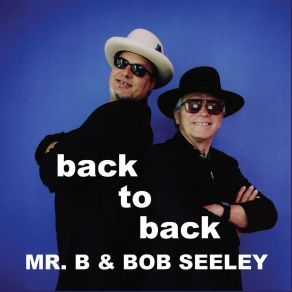Back To Back
Download links and information about Back To Back by Mr. B, Bob Seeley. This album was released in 2007 and it belongs to Blues, Jazz genres. It contains 12 tracks with total duration of 50:25 minutes.

|
|
|---|---|
| Artist: | Mr. B, Bob Seeley |
| Release date: | 2007 |
| Genre: | Blues, Jazz |
| Tracks: | 12 |
| Duration: | 50:25 |
| Buy it NOW at: | |
| Buy on iTunes $9.99 | |
Tracks
[Edit]| No. | Title | Length |
|---|---|---|
| 1. | St. Louis Blues | 7:37 |
| 2. | Chicago Breakdown | 2:50 |
| 3. | C.C. Rider | 3:41 |
| 4. | The Honeydripper | 3:35 |
| 5. | After Hours | 5:47 |
| 6. | After Hours | 5:19 |
| 7. | Cow Cow Blues | 4:05 |
| 8. | Cow Cow Blues | 2:41 |
| 9. | It Don't Mean a Thing (if It Ain't Got That Swing) | 3:38 |
| 10. | It Dont Mean a Thing (if It Aint Got That Swing) | 3:25 |
| 11. | Pine Top's Boogie | 3:29 |
| 12. | Honky Tonk Train Blues | 4:18 |
Details
[Edit]As its title suggests, Back to Back presents alternate performances by Michigan-based boogie-woogie pianists Mr. B (aka Mark Lincoln Braun) and Bob Seeley. First the younger Mr. B gives his interpretation of a blues piano standard, then the more mature Seeley follows with his, for seven paired tracks, followed by individual versions of "Pine Top's Boogie" (Mr. B) and "Honky Tonk Train Blues" (Seeley). Never do the two play together. The alternation, of course, tends to emphasize the differences between the two stylistically similar players, and it would be interesting to know whether one listened to the other before committing his version to disc. In general, Mr. B takes the more unusual approach, for example introducing much original material up-front before getting down to business on the opening track, "St. Louis Blues," whereas Seeley, on track two, just dives right in. Mr. B's "C.C. Rider" has a slow, somewhat staccato rhythm, but Seeley's is more familiar. Mr. B's "It Don't Mean a Thing (If It Ain't Got That Swing)" is so unusual that it really ain't got that swing; Seeley's, of course, does. Sometimes, as in "The Honeydripper," the two pianists seem to be playing entirely different songs. But even when they both adopt the same tempo, as on "After Hours," each comes up with a unique interpretation. It would be easy to suppose, listening to Back to Back, that it had been recorded in the 1930s rather than the 2000s, but the album demonstrates, by pairing a younger boogie-woogie player with the man he calls his "illegitimate father," that the musical style still has some new things to say, along with the old pleasures it continues to provide.